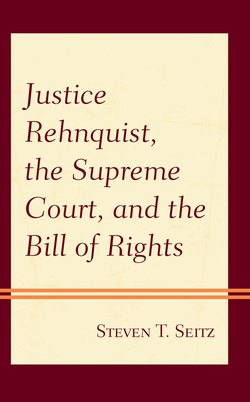Читать книгу Justice Rehnquist, the Supreme Court, and the Bill of Rights - Steven T. Seitz - Страница 34
На сайте Литреса книга снята с продажи.
Citizenship(s)
ОглавлениеThe full faith and credit clause reflects how one state accepts as official the acts of another. The privileges and immunities clause switches from the relation among states to the relation between the state and the citizen. The clause assumes that the relation between a state and one of its citizens is the same as the relation between itself and a citizen from another state but within its borders. Both clauses defy the separation of citizenships. If there are state citizenships and a national citizenship, what does either clause mean, and what are their purposes? Exactly how the Fugitive Slave Act of 1850 squares with these clauses also turns on the status of citizenship. Several states had given citizenship to former slaves or their descendants. If a runaway slave or descendants were to qualify for citizenship in a free state, the person would become a citizen of the free state, fully eligible for making contracts, and protected by that state’s laws against the statutory reach of the Fugitive Slave Act. Taney’s argument that there is a citizenship in a state and a different citizenship in the United States only further obfuscates. Each state grants its citizenship, but citizenship in a state does not grant citizenship in the nation. A freed black enjoying rights in a free state is a slave if traveling in a slave state. Since Taney held that no blacks voluntarily entered the United States, but all did so as property, no one or their descendants would ever qualify for national citizenship and thus forever remain property in the eyes of the central government. Changing attitudes in some states aside, the national legislation governing the return of slave property remained national law.
The implications go much further. The contracts clause applies only to national citizens, leaving different mixes of contracts with varying degrees of certainty and that certainty, in turn, varied by state. If the Fugitive Slave Act creates a contract between the federal government and both slave or free states, it in fact serves slave state interests and undermines citizenships granted in free states. No direct Constitutional clause mimics the Fugitive Slave Act. The Constitution allows the national government to end the slave trade in 1808, raising the further complication that a contract after that time may have different reach than one before that time. There is nothing in the Constitution forbidding the voluntary migration of Africans to America and hence Taney’s premise had its own sunset clause.
Two ironies appear. The first asks what happened with the full faith and credit clause. Each state should give full faith and credit to the public acts, records, and judicial proceedings in every other. The decision of one state to extend citizenship to a former slave or descendant then would be a recognized decision in every other. The Constitution has no formalism giving substance to Taney’s distinction between national citizenship and state citizenship, or for that matter the asymmetry between the two. SCOTUS had long recognized that these two Constitutional clauses, full faith and credit and privileges and immunities, struck at the heart of state sovereignty. SCOTUS would have to ignore or interpret one or the other into meaningless or innocuous construction. Second, the very court espousing states-rights relies on national legislation, the Fugitive Slave Act, to assert and assist state sovereignty. The logical difficulties here would be an important backdrop for the 14th Amendment.
